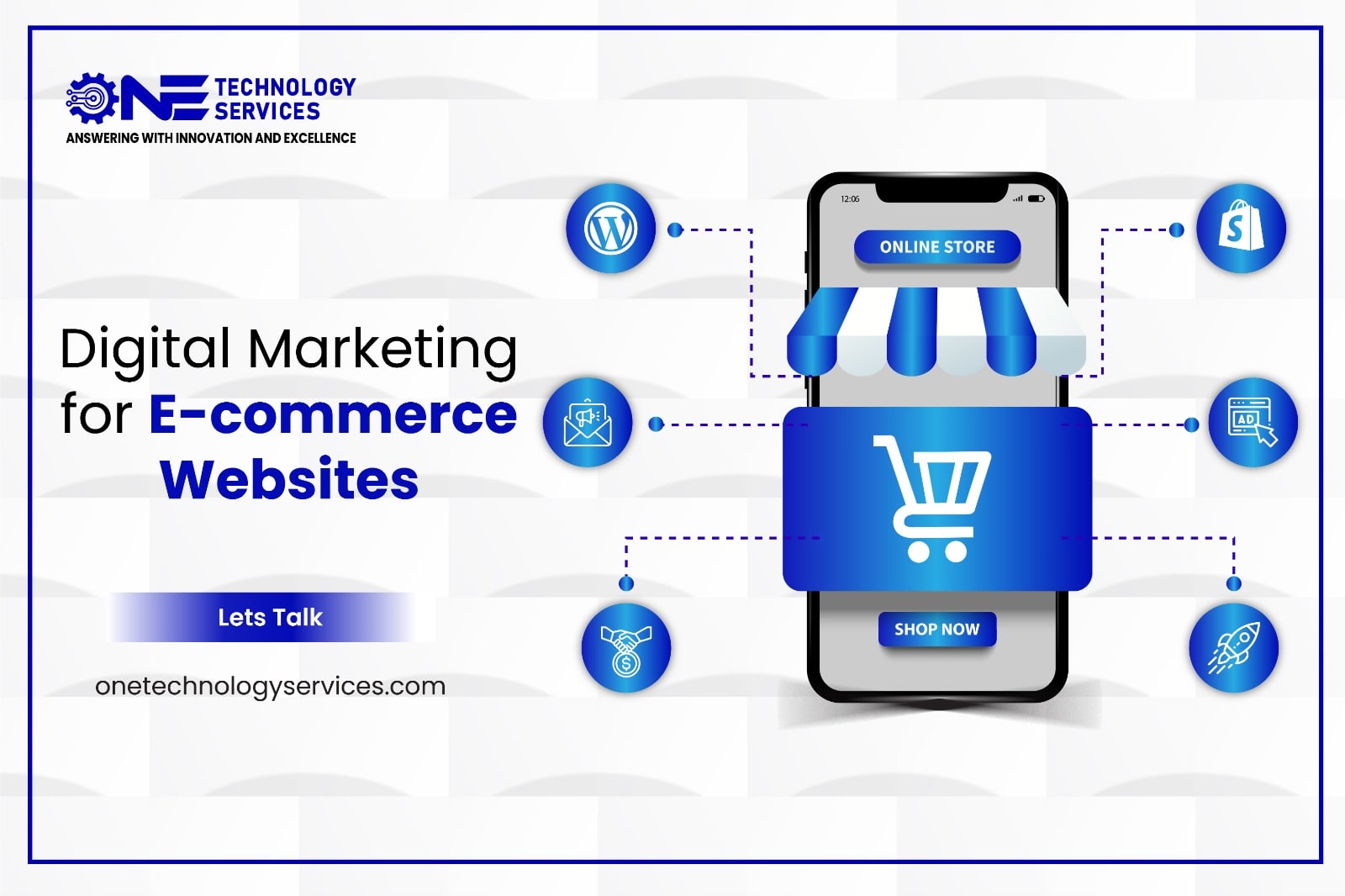Digital marketing services for e-commerce websites have become paramount in the ever-competitive world of online retail. As you aim to carve a niche for your online store, understanding the power of digital marketing is essential. In this article, we will explore how digital marketing services for e-commerce websites can be the driving force behind your success, with this crucial keyword strategically emphasized 10 times throughout the content.
Digital Marketing Services for E-commerce Websites: An Overview

In a world where consumers increasingly prefer online shopping, your e-commerce website needs to be more than just an option. It must be the top choice. Effective digital marketing services for e-commerce websites can ensure your brand gets the visibility and attention it deserves. From SEO to email marketing, these strategies can give your online business the edge it needs to stand out.
→ Explore the power of our digital marketing services and transform your online presence today.
The Significance of Digital Marketing Services for E-commerce Websites

The concept of digital marketing services for e-commerce websites encompasses a wide range of strategies designed to increase your online presence and drive sales. Let’s delve into these services and how they can benefit your e-commerce venture.
Search Engine Optimization (SEO): Your Path to Visibility
“Search Engine Optimization” is the cornerstone of online visibility. When potential customers search for products or services that your e-commerce site offers, effective SEO can ensure it appears at the top of search engine results.
Pay-Per-Click Advertising (PPC): A Quick Boost
PPC advertising is a powerful method to promptly increase website traffic. Platforms like Google Ads and Bing Ads allow you to bid on keywords, ensuring that your website appears prominently in search results. This technique is cost-effective because you only pay when a user clicks on your ad.
Social Media Marketing: The Power of Engagement
Social media platforms offer an expansive audience for e-commerce websites. Through strategies such as “Facebook Ads” and “Instagram Ads,” you can reach potential customers based on their interests and demographics. Engaging content and targeted advertising campaigns can significantly increase your brand’s visibility and sales.
Content Marketing: Quality Meets Engagement
“Content marketing” involves creating informative and engaging content to attract potential customers and establish your e-commerce website as an industry authority. Through blog posts, videos, infographics, and more, you can attract organic traffic and cultivate brand loyalty.
Email Marketing: Nurturing Customer Relationships
Effective “email marketing” can help you connect with existing customers and keep them engaged. It’s also a potent tool for attracting potential customers with exclusive promotions, product updates, and personalized recommendations.
Influencer Marketing: Trust Through Authenticity
Leveraging industry influencers can expand your reach and build trust among potential customers. Collaborating with influencers who resonate with your brand can lead to product reviews, unboxing videos, and other authentic content that drives traffic and sales to your website.
Conversion Rate Optimization (CRO): Turning Visitors into Buyers
Optimizing the user experience on your e-commerce website is essential to converting visitors into customers. CRO services can improve your website’s design, speed, and user-friendliness, ultimately increasing sales.
Analytics and Data Insights: Making Informed Decisions
To refine your digital marketing strategy, tracking and analyzing data is crucial. Services like “Google Analytics” provide valuable insights into user behavior, empowering you to make data-driven decisions to enhance your website’s performance and marketing efforts.
Mobile Marketing: Embracing the Mobile Era
As mobile shopping continues to surge, it’s vital to optimize your e-commerce site for mobile users. Mobile marketing strategies, including mobile-friendly design and app development, ensure a seamless shopping experience.
Reputation Management: Fostering Trust
Your online reputation is pivotal to building trust with potential customers. Reputation management services can help monitor and improve customer reviews and ratings, ensuring your brand maintains a positive online image.
FAQs
Q1: What are digital marketing services for e-commerce websites?
A1: Digital marketing services for e-commerce websites encompass a range of online marketing strategies and techniques designed to increase a website’s visibility, attract visitors, and drive sales. These services include SEO, PPC advertising, social media marketing, email marketing, and more.
Q2: How can SEO benefit my e-commerce website?
A2: SEO, or Search Engine Optimization, can benefit your e-commerce website by improving its visibility on search engines like Google. It involves optimizing your site’s content and structure to rank higher in search results, which can lead to increased organic traffic and potential customers.
Q3: What is the role of PPC advertising in e-commerce digital marketing?
A3: PPC (Pay-Per-Click) advertising allows you to bid on keywords and display ads at the top of search engine results. You only pay when a user clicks on your ad, making it a cost-effective way to attract targeted traffic to your e-commerce site.
Q4: How can social media marketing help my e-commerce business?
A4: Social media marketing enables you to reach a broader audience through platforms like Facebook, Instagram, and Twitter. By creating engaging content and targeted advertising campaigns, you can increase your brand’s visibility, engage with potential customers, and drive sales.
Q5: What is content marketing, and why is it important for e-commerce websites?
A5: Content marketing involves creating high-quality, informative, and engaging content, such as blog posts, videos, and infographics. It’s important for e-commerce websites as it can attract organic traffic, establish your site as an industry authority, and help in showcasing your products effectively.
Q6: How does email marketing benefit e-commerce businesses?
A6: Email marketing is a powerful tool for e-commerce websites to connect with both existing and potential customers. It allows you to send product updates, exclusive promotions, and personalized recommendations, fostering customer engagement and driving sales.
Q7: What is influencer marketing, and how can it be used for e-commerce websites?
A7: Influencer marketing involves partnering with individuals who have a strong presence and following in your industry. They create authentic content, such as product reviews or unboxing videos, which can drive traffic and sales to your e-commerce website through their influence and credibility.
Q8: How can I optimize my e-commerce website’s conversion rate?
A8: Conversion Rate Optimization (CRO) involves improving your website’s design, speed, and user-friendliness to turn visitors into customers. By streamlining the buying process and providing a better user experience, you can increase sales and conversions.
Q9: What role do analytics and data insights play in digital marketing for e-commerce websites?
A9: Analytics tools like Google Analytics provide valuable data on user behavior, which can be used to make data-driven decisions. These insights help refine your digital marketing strategy, improve your website’s performance, and enhance marketing efforts.
Q10: Why is mobile marketing essential for e-commerce websites?
A10: With the increasing use of mobile devices for online shopping, optimizing your e-commerce website for mobile users is crucial. Mobile marketing strategies, such as mobile-friendly design and mobile app development, ensure a seamless shopping experience, catering to a broader audience.
Q11: What is reputation management, and why is it important for e-commerce businesses?
A11: Reputation management involves monitoring and improving customer reviews and ratings to maintain a positive online image. Positive reviews and a good reputation build trust with potential customers and can significantly impact your e-commerce business’s success.
Final Thoughts
In summary, the effectiveness of digital marketing services for e-commerce websites cannot be overstated. These strategies, when harnessed correctly, can enhance your online presence and drive sales. To succeed in the competitive e-commerce landscape, it is imperative to invest in these services. Make them an integral part of your strategy, and watch your e-commerce business thrive.
